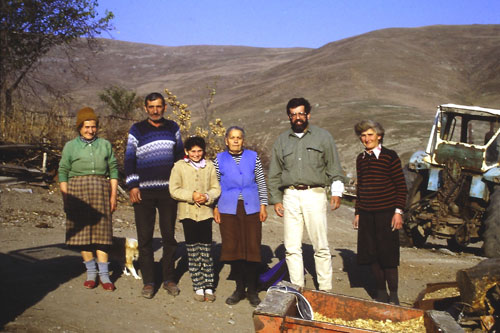
Fred Paillet is a student of life.
In recent years, he has worked with graduate students in Brisbane and Prague, traveled to China to work on tree species restoration, and led an expedition to the Brooks Range in far northern Alaska. While these projects would be impressive on any professional resume, Paillet's motivation doesn't involve building his curriculum vitae. In fact, Paillet has been retired from his formal career for 11 years. But he is certainly not retired from continuing to gather life experiences.
Paillet's experience is typical of many Osher Lifelong Learning Institute members, who develop and explore different learning methods involving a diversity of intellectual topics. OLLI is a member-driven program based at the University of Arkansas that offers non-credit classes, trips, and seminars in areas such as history, current events, literature, science, and local interests. Many members, including Paillet, develop courses based on expertise from prior careers or experiences.
This fall, Paillet's course will examine the literary legacy of the Caucasus mountain region in Russia, where he has spent time working. Paillet's enthusiasm for the topic is apparent.
"The Caucasus mountain region is the wild west of Russia, and served as inspiration for some of the country's most beloved writers and painters," he explained.
Tolstoi and Pushkin, for example, both spent time in military exile in the region, and Paillet wants to examine the influence of these experiences in Russian literature. The region continues to have implications in a turbulent social and political landscape, which makes the course particularly relevant, Paillet explained. The course is particularly timely since the region will be highlighted during the upcoming Winter Olympics.
Finding Opportunity Through Networks
Paillet hasn't always been an expert on Russian literature. He spent his career with the U. S. Geological Survey, conducting geophysical investigations involving resource assessment, environmental remediation, and past climate. One project involved developing high-resolution borehole flow measurement and analysis techniques, with applications in understanding water supplies. This experience continues to offer him opportunities to travel abroad and work with various teams that are utilizing his measurement methods.
When asked why he chose this field, Paillet's answer is simple: "I'm fascinated by the way the earth works." This sentiment seems to apply to many of Paillet's diverse interests.
"As it turns out," he chuckled, "I'm also an amateur botanist."
In 2008, Paillet was part of a U.S. Department of Agriculture exchange program in Beijing to restore the American chestnut.
"They wanted a climate scientist on the project," Fred explained. "I was available."
He is currently working to reconstruct the ecology of our beloved Ozark chinquapin, a species almost completely lost as a result of an introduced disease.
This sense of serendipity seems to color many of Paillet's additional travels. He has sought out work on multiple continents, soaking up as much experience as he can in different countries. He has used his colleagues at the University of Rochester, where he received bachelor's, master's, and doctoral degrees, to expand his networks.
"Whenever you visit your old contacts, you make new contacts," he said.
Asking questions of professionals further allowed Paillet to make inroads in his various pursuits. After going on a trip to Alaska through the Sierra Club Outings program, Paillet began to "bombard" the Alaska Fish & Game Commission with questions, and he gradually got to "know the pros." He eventually returned to Alaska as an expedition leader, his most recent trip involving an emergency bushflight pick-up after a week of torrential rain.
"The only good thing is that we saw wolves who looked as miserable as we did."
Continuing to Learn and Teach
Paillet was initially attracted to the OLLI program at the University of Arkansas by classes on the history of Fayetteville. Paillet and his wife chose Fayetteville for retirement in 2009, attracted by the "vibrant University community." He had become familiar with the area through colleagues with whom he conducted periodic academic and professional seminars. Additional OLLI interests include archaeology. Paillet mentioned a class about Amarna, a one-time ancient Egyptian capital that is now a prime archaeological site, as being especially enjoyable. Paillet also enjoys teaching OLLI classes as much as he enjoys taking them.
"I enjoy sharing my experiences in places I've worked or traveled. It forces me to refresh my memory, and I get as much out of it as I give."
When asked about ways that members might benefit from OLLI, Paillet gets back to the basics: "I like to learn stuff. The worst thing in life is that there are things out there that delight you, but you might never know that they existed."
To see more pictures from Paillet's travels, visit coehp.uark.edu/colleague.
The Osher Lifelong Learning Institute is a research and service unit of the College of Education and Health Professions at the University of Arkansas. For more information, visit olli.uark.edu. Contact OLLI at olli@uark.edu or 479-575-4545.
By Katie Helms, interim director, OLLI
Contacts
Heidi Wells, director of communications
College of Education and Health Professions
479-575-3138,